

And diabetes: My story. The TikTok stars giving diabetes the needle. Media playback is unsupported on your device When best friends Ellen Watson and Beth McDaniel posted a TikTok video of themselves getting glammed up for a night out, they had no idea they were about to become a viral sensation.
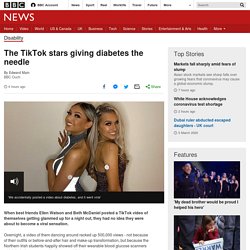
Overnight, a video of them dancing around racked up 500,000 views - not because of their outfits or before-and-after hair and make-up transformation, but because the Northern Irish students happily showed off their wearable blood glucose scanners which help them manage their type one diabetes. Rather than conceal the small white discs under clothing as many people do, Beth and Ellen displayed them on their bare arms and pointed to them as they danced. The video propelled them into the social media stratosphere and the Diabetic Duo was born. "It's just been crazy," Ellen, 19, told the BBC Ouch podcast. "Even non-diabetic people were commenting: 'What is this? Image copyright Diabetic Duo Then, last August, Beth's 12-year-old sister was diagnosed. Type 2 diabetes 'urgent public health crisis' in Wales.
Gestational diabetes. Gestational diabetes is high blood sugar (glucose) that develops during pregnancy and usually disappears after giving birth.
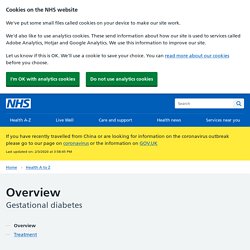
It can happen at any stage of pregnancy, but is more common in the second or third trimester. It happens when your body cannot produce enough insulin – a hormone that helps control blood sugar levels – to meet your extra needs in pregnancy. Gestational diabetes can cause problems for you and your baby during pregnancy and after birth. But the risks can be reduced if the condition is detected early and well managed. LONG TERM HEALTH - Verity - The UK PCOS Charity. There is a big misconception that PCOS is only a condition to worry about whilst you are in your fertile years, however polycystic ovary syndrome is a condition for life and unfortunately comes with very serious long term health risks such as type 2 diabetes, endometrial cancer and cardiovascular disease.
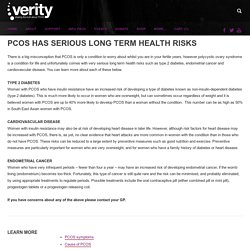
You can learn more about each of these below.TYPE 2 DIABETESWomen with PCOS who have insulin resistance have an increased risk of developing a type of diabetes known as non-insulin-dependent diabetes (type 2 diabetes). This is much more likely to occur in women who are overweight, but can sometimes occur regardless of weight and it is believed women with PCOS are up to 40% more likely to develop PCOS than a woman without the condition.
This number can be as high as 50% in South East Asian women with PCOS.CARDIOVASCULAR DISEASEWomen with insulin resistance may also be at risk of developing heart disease in later life. Diabulimia: 'Diabetes and eating disorder almost killed me' Image copyright Gwen Edwards When it was at its worst, Gwen Edwards thought: "How on earth am I still here?
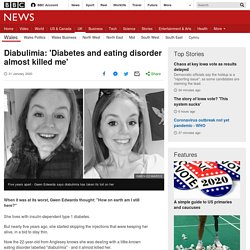
" She lives with insulin-dependent type 1 diabetes. But nearly five years ago, she started skipping the injections that were keeping her alive, in a bid to stay thin. Now the 22-year-old from Anglesey knows she was dealing with a little-known eating disorder labelled "diabulimia" - and it almost killed her. "It's a voice in my head that tells me I don't need injections," said the teaching assistant, from Rhydwyn on Anglesey. "It's a vital medicine that I need to keep myself alive. "It's a shock to me that I haven't made myself worse than what I am now. " The term for the disorder combines diabetes with the eating disorder bulimia. It is only experienced by individuals such as Gwen, who must inject insulin to survive. It has been described as an "invisible condition" by experts at the charity Diabetes UK - invisible and potentially deadly. Image copyright Getty Images. DESMOND type 2 diabetes structured education programme.
Structured education using Dose Adjustment for Normal Eating (DAFNE) reduces long‐term HbA1c and HbA1c variability. Introduction The Diabetes Control and Complications Study (DCCT) demonstrated that tight glycaemic control as measured by HbA1c reduced microvascular complications in people with Type 1 diabetes 1.
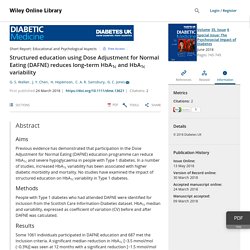
Current guidelines for the management of adults with Type 1 diabetes advocate structured training in insulin dose adjustment skills to support the person with diabetes in achieving tight glycaemic targets 2, 3. In the UK, the national Dose Adjustment for Normal Eating (DAFNE) programme, derived from the German Diabetes Teaching and Treatment Programme (DTTP), provides an evidence‐based training course for adults with Type 1 diabetes. Effectiveness of psychoeducational interventions for the treatment of diabetes-specific emotional distress and glycaemic control in people with type 2 diabetes: A systematic review and meta-analysis.
Patient Voices: Stories from the NHS Institute for Innovation and Improvement Diabetes in-patient workshop – Patient Voices. Going into hospital presents particular challenges to people with diabetes.
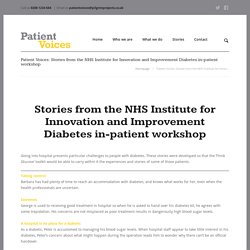
These stories were developed so that the Think Glucose’ toolkit would be able to carry within it the experiences and stories of some of those patients. Taking control Barbara has had plenty of time to reach an accommodation with diabetes, and knows what works for her, even when the health professionals are uncertain. Extremes George is used to receiving good treatment in hospital so when he is asked to hand over his diabetes kit, he agrees with some trepidation. His concerns are not misplaced as poor treatment results in dangerously high blood sugar levels. A hospital is no place for a diabetic As a diabetic, Peter is accustomed to managing his blood sugar levels. Double trouble Caring for a partner with Diabetes requires a wide range of skills, in order to provide effective care and deal with hospital and emergency services. Hard-boiled eggs It’s easy to make assumptions. Flash glucose monitoring. Insulin pumps. Checking your blood sugar levels.